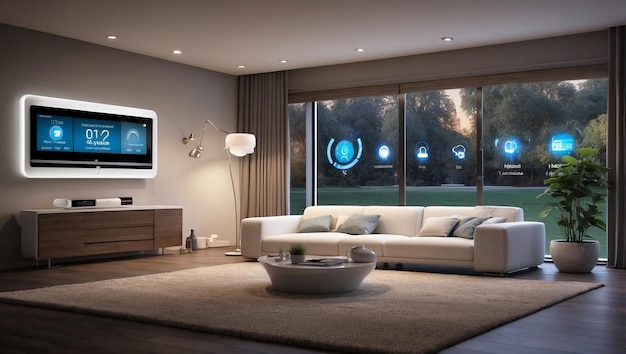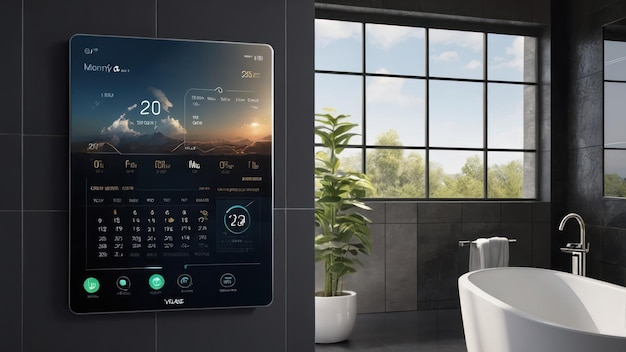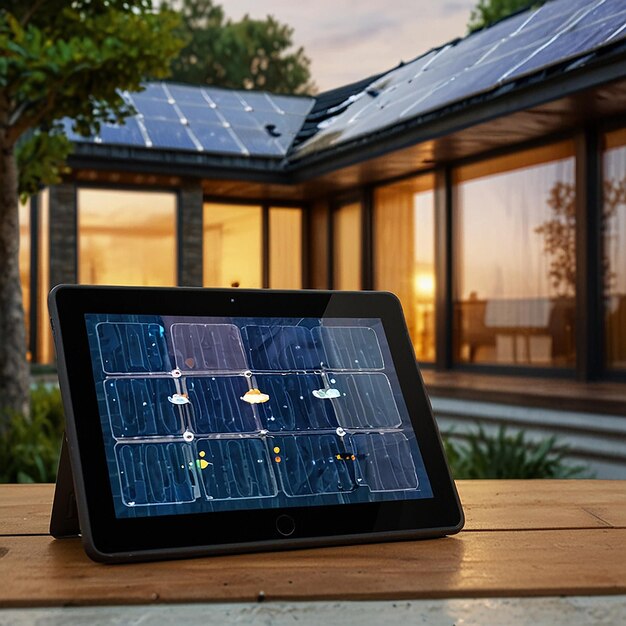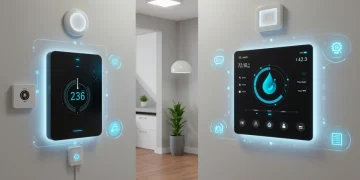Smart Home Tech: Will It Boost Your Property Value by 10% in 2025?

Smart home technology is projected to significantly influence property values, potentially increasing them by up to 10% by 2025, due to enhanced convenience, security, and energy efficiency that appeal to modern homebuyers in the US market.
Imagine stepping into a home where lights adjust to your mood, security is seamlessly integrated, and energy consumption is optimized. The allure of smart home technology is undeniable, but how will smart home tech impact your property value by 10% in 2025? Let’s explore.
The Rise of Smart Homes in the US Market
The US housing market is rapidly evolving, with modern homebuyers increasingly prioritizing technology-driven features. This shift is fueled by a desire for convenience, security, and energy efficiency, making smart home technology a significant value proposition.
Understanding the current state and growth trajectory of smart homes is crucial to grasping their potential impact on property values.
Current Adoption Rates of Smart Home Tech
Adoption rates of smart home technology in the US have been steadily increasing. Devices like smart thermostats, security systems, and lighting controls are becoming commonplace in many households. The prevalence of voice assistants like Amazon Alexa and Google Assistant further drives integration, making homes more connected and user-friendly.
Projected Growth of Smart Homes by 2025
Industry analysts predict continued growth in the smart home sector. Factors such as decreasing device costs, increasing consumer awareness, and advancements in technology are expected to fuel this expansion. By 2025, a significant percentage of US homes are projected to incorporate some form of smart technology, making it a standard expectation among potential homebuyers.
- Enhanced Convenience: Automation of daily tasks.
- Improved Security: Advanced monitoring and protection.
- Energy Efficiency: Reduced utility costs and environmental impact.
The overall trend indicates that smart home technology is no longer a luxury but a desirable feature that can significantly influence a property’s appeal and market value.
Key Smart Home Technologies Driving Property Value
Several smart home technologies are emerging as key drivers of property value. These features not only enhance the living experience but also provide tangible benefits that appeal to a wide range of homebuyers.
Identifying these technologies and understanding their impact on perceived value is essential for homeowners looking to invest wisely.

Smart Security Systems
Smart security systems are a major draw for homebuyers concerned about safety and peace of mind. These systems often include features like remote monitoring, video surveillance, and automated alerts, providing enhanced protection against intrusion and other threats.
Smart Lighting and Climate Control
Smart lighting and climate control systems offer convenience and energy savings. Programmable thermostats and automated lighting can optimize energy consumption, reducing utility costs and environmental impact. These features are particularly appealing to eco-conscious homebuyers.
- Energy Savings: Reduced utility bills.
- Remote Control: Convenient management from anywhere.
- Increased Security: Enhanced protection and monitoring.
By focusing on these value-added technologies, homeowners can significantly enhance their property’s appeal and increase its market value.
Energy Efficiency and Sustainability Appeal
Energy efficiency and sustainability are increasingly important considerations for homebuyers. Smart home technologies that contribute to these goals can significantly boost a property’s appeal and value.
Understanding how these features translate into cost savings and environmental benefits is crucial for attracting modern buyers.
Impact of Smart Thermostats on Energy Consumption
Smart thermostats play a key role in optimizing energy consumption. These devices learn homeowners’ habits and adjust temperatures automatically, reducing energy waste and lowering utility bills. The ability to control thermostats remotely adds further convenience and savings.
Benefits of Smart Lighting Systems
Smart lighting systems offer similar energy-saving benefits. Programmable lighting schedules and occupancy sensors ensure that lights are only on when needed, reducing energy consumption and extending the lifespan of bulbs. The ability to control lighting remotely adds convenience and enhances security.

- Reduced Utility Costs: Lower monthly bills.
- Environmental Benefits: Reduced carbon footprint.
- Increased Home Value: Enhanced market appeal.
By integrating energy-efficient smart home technologies, homeowners can attract environmentally conscious buyers and increase their property’s value proposition.
The Role of Home Automation in Convenience and Lifestyle
Home automation is a major selling point for modern homebuyers seeking convenience and an enhanced lifestyle. Smart home technologies that automate daily tasks and provide seamless integration can significantly increase a property’s appeal.
Exploring different automation features and their impact on quality of life is essential for understanding their contribution to property value.
Automated Task Management
Smart home systems can automate a wide range of tasks, from controlling window blinds to managing irrigation systems. These features save time and effort, making daily life more convenient and enjoyable. The ability to customize automation settings adds further appeal.
Entertainment and Connectivity Integration
Integration of entertainment systems and connectivity devices is another key aspect of home automation. Smart TVs, sound systems, and whole-house audio can be controlled from a central interface, creating a seamless entertainment experience. High-speed internet connectivity and smart home hubs further enhance the value proposition.
By focusing on seamless integration and user-friendly interfaces, homeowners can create a smart home environment that appeals to a wide range of buyers and increases their property’s market value.
Security Enhancements and Peace of Mind
Security is a paramount concern for many homebuyers, and smart home technologies offer a range of features designed to enhance safety and provide peace of mind. These security enhancements can significantly increase a property’s attractiveness and value.
Understanding the benefits of smart security systems and their impact on perceived safety is crucial for leveraging their value.
Smart Surveillance Systems and Remote Monitoring
Smart surveillance systems are a key component of home security. These systems often include features like video cameras, motion sensors, and remote monitoring capabilities. Homeowners can monitor their property from anywhere, receiving alerts in real-time if suspicious activity is detected. Integration with professional monitoring services adds an extra layer of protection.
Smart Locks and Access Control
Smart locks and access control systems offer enhanced security and convenience. These systems allow homeowners to control access to their property remotely, granting entry to authorized individuals and tracking who comes and goes. Keyless entry and temporary access codes add further flexibility and security.
- Remote Monitoring: Real-time surveillance from anywhere.
- Automated Alerts: Immediate notification of suspicious activity.
- Enhanced Access Control: Secure and convenient entry management.
By prioritizing security enhancements and leveraging smart home technologies, homeowners can create a safe and secure living environment that appeals to a wide range of buyers and increases their property’s value.
Future Trends: What’s Next for Smart Homes and Property Value?
The smart home landscape is constantly evolving, with new technologies and trends emerging all the time. Staying ahead of these developments is crucial for homeowners looking to maximize the value of their properties.
Exploring future trends and their potential impact on property values will help homeowners make informed investment decisions.
Integration of AI and Machine Learning
One of the most significant trends in smart home technology is the integration of artificial intelligence (AI) and machine learning. These technologies enable homes to learn homeowners’ habits and preferences, automating tasks and optimizing energy consumption. AI-powered security systems can also detect anomalies and respond to threats more effectively.
Advancements in Wireless Technology
Advancements in wireless technology are also shaping the future of smart homes. Improved Wi-Fi standards and the emergence of new protocols like Matter are making it easier to connect devices and create seamless, integrated systems. These advancements will drive further adoption of smart home technology and increase its value proposition.
- AI-Powered Automation: Enhanced convenience and efficiency.
- Seamless Integration: Improved connectivity and user experience.
- Sustainable Solutions: Environmentally friendly features for long-term value.
By embracing these future trends and investing in cutting-edge smart home technology, homeowners can position their properties for long-term success and maximize their market value.
| Key Point | Brief Description |
|---|---|
| 💡 Smart Security | Advanced systems enhance safety. |
| 🌱 Energy Efficiency | Smart tech reduces utility costs. |
| 🕹️ Home Automation | Convenience improves lifestyle. |
| 🔒 AI Integration | AI adapts to user preferences. |
Frequently Asked Questions
▼
Yes, it’s likely. Modern buyers want convenience and efficiency. Upgrading to smart security, lighting, and thermostats makes your home more attractive, potentially boosting its value.
▼
Smart security and energy-efficient upgrades often give the highest ROI. Buyers value safety and lower utility bills, making these features a smart investment for increasing property value.
▼
Energy efficiency is increasingly vital. Smart thermostats, lighting, and solar panels can lower utility bills, appealing to eco-conscious buyers and enhancing your property’s worth.
▼
Potential downsides include cost and privacy concerns. Ensure systems are secure and respect privacy. Costly or overly complex setups may deter some buyers, so simple and reliable systems are ideal.
▼
Choose reliable, user-friendly systems. Prioritize security and energy efficiency. Keep it simple and secure, meeting privacy standards, and show potential savings to buyers.
Conclusion
The integration of smart home technology presents a compelling opportunity for homeowners to enhance their property’s value. By focusing on key features like security, energy efficiency, and automation, homeowners can attract modern buyers and position their properties for success in the evolving real estate market. As technology continues to advance, staying informed and investing wisely will be crucial for maximizing the long-term benefits of smart home integration.





